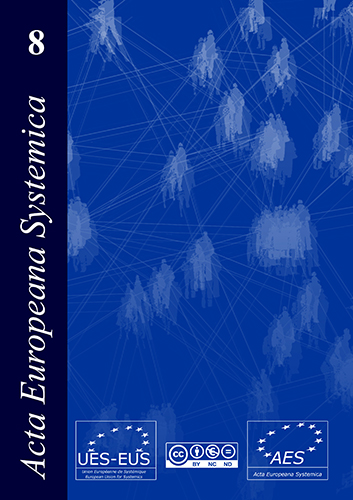International Academy for Systems and Cybernetic Sciences (IASCYS): The first awards of the International Prize
DOI:
https://doi.org/10.14428/aes.v8i1.56583Keywords:
congress, giftedness, IASCYS, IFSR, International Prize, reliability, reliance, Systems Science, workshopsAbstract
For the first time the International Academy for Systems and Cybernetic Sciences, IASCYS, ( http://iascys.org), has awarded the Charles François International Prize, during the 10thUES-EUS Congress (http://ues-eus.eu), in Brussels, Belgium, Europe. The first step of the procedure was the nomination of interesting papers through asking for the reviewing process by all IASCYS Academicians. So, 6 weeks before the start of the meeting, a booklet of 40 abstracts, all previously anonymously peer-reviewed by the scientific committee of the congress, and each as a 1 page of text, with neither author(s) name(s), nor affiliation(s) or references, was sent to all Academicians. After a 1 month delay, 10 papers of people from 9 Countries (Algeria, Belgium, Denmark, France, Germany, Greece, Italy, Portugal, Russia), have been nominated by Academicians, by e-mails replies. After the congress organizers have proposed as jurors a team of 3 systems scientists who all are speaking both French and English (the official formal languages of the UES-EUS congress), an equal number of 3 Academicians, who are as well fluent in English, French and other languages, attended as the IASCYS part of the jury. After this key step of peers pre-selection, the second step, during the meeting in Brussels, was for all 6 jurors to listen and participate to the corresponding talks-debate for each of the selected papers, in order to rank the top 3 of the most promising works, and then to reflect on the final ranking for the award. The jurors were anonymous. The listening process was the usual process of talk (20 min) and questions (10 min) with the public as in every congress, but also with personal no-formal discussion of jurors with the nominated persons. The first Charles François International Prize of the Academy (gold medal) was awarded to Julio LABORDE, a young Chilean research engineer who is working in the International industrial firm 'Insight Signals'. He is also a student in the prestigious École Pratique des Hautes Études, in Paris, France. His talk was about "Extraction of Information from Agent Base Models. A new pre-topological metric for controlling the propagation of crises." It took place during the 'Methods and tools for risk management of complex socio-technical systems'session. No discussion, his work was the most promising work of the congress. His work was the most promising work of this congress of the European Union for Systemics.
This second step allows also, after a debate, to award 3 second places (3 silver medals). They all got the Charles François tutorial in Systems Science on a USB stick and they all, gold and silver medals (Figure 1), will have a certificate of ranking. But, all of them, will get their certificates of award/ranking only after their paper proof will be corrected and accepted. The other 3 certificated persons, silver medals, are (by alphabetic order): -Mick ASHBY, a research engineer in computing sciences who is working for IBM in Germany. His work was about the application of a new paradigm 'The Ethical Regulator Theorem'; -Tjorven HARMSEN, a very young Swedish women who is in Ph. D. in the Leibniz Institute for Research on Society and Space, in Berlin (Germany). Her work was ab out 'Crisis as Social Autocatalysis. On the emergence and Utilization of Opportunities' (a very promising talk, a young researcher to follow; and -Daniela TERRILE, a women who is Professor in the Department of Design at the Polytechnic Institute of Milano, Italy. Her work was about 'Applications of the Target Constellation Model'. 2 other works were also very interesting but one was not into the book of abstracts (it was not peer-reviewed), the other one was into it but it was not pre-selected. No process is perfect. But the rule is the rule: no peer-reviewing, no preselection, means no competition. The important point is that few of the 'preselected and nominated, but not ranked in the top 3' participants said they will attend the next one edition of the Prize in Morocco. And other young researchers said they will do their best to attend another occurrence of the Prize. The Prize was opened to strengthen multi-disciplinary research and the multi-language communication of recent results, towards a worldwide education in Cybernetics and Systems Thinking (Bricage, 2017), which are aims of the Academy (Bricage, 2014). “Want to influence the world? Map reveals the best languages to speak.” (Ronen et al., 2014). On the IASCYS website you will find the rules of the Prize, in English, Spanish, French and Russian.
Published
How to Cite
Issue
Section
License




